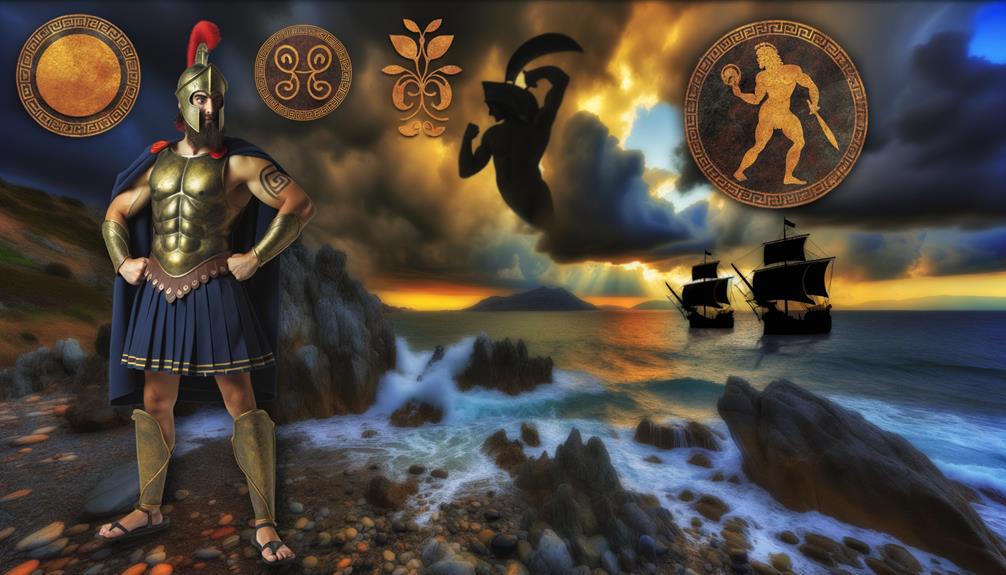Meaning of the Name Odysseus
The name "Odysseus" is derived from the Greek verb "odýssomai," meaning "to be angry" or "to hate," suggesting an intrinsic connection to emotional and physical struggles. Additionally, it may link to "odýnē," translating to "pain" or "grief," highlighting the trials faced by the hero in Greek mythology.
This etymology underscores the complexity of Odysseus's character, encapsulating his journey marked by anger, adversity, and resilience. Scholars have debated its precise origins, but the consensus centers on its thematic relevance to the hero's attributes and narrative arc.
Intriguing details await those who explore further.

Key Takeaways
- The name 'Odysseus' originates from the Greek verb 'odyssomai', meaning 'to be angry' or 'to hate'.
- It may also relate to 'odynē', translating to 'pain' or 'grief', highlighting his trials.
- The name signifies emotional and physical struggles central to Odysseus's narrative.
- It reflects the hero's cunning, intellectual prowess, and resilience in Greek mythology.
- The etymology has been extensively debated among scholars for its complex implications.
Etymology of Odysseus
The etymology of the name 'Odysseus' has been a subject of extensive scholarly debate, with roots that trace back to ancient Greek language and mythology.
Derived from the Greek 'Ὀδυσσεύς' (Odysseus), the name is believed to be associated with the verb 'ὀδύσσομαι' (odýssomai), meaning 'to be angry' or 'to hate'. This interpretation aligns with the character's tumultuous journey and the adversities he endures.
Additionally, some scholars propose a link to the word 'ὀδύνη' (odýnē), translating to 'pain' or 'grief', further emphasizing the trials faced by this legendary hero.
Therefore, the name encapsulates both the emotional and physical struggles central to Odysseus's narrative, reflecting a complex interplay of linguistic and mythological elements.
Odysseus in Greek Mythology
Odysseus, a central figure in Greek mythology, is renowned for his heroic adventures and trials, which are vividly portrayed in Homer's epic poems.
His cleverness and cunning not only facilitated his survival and triumph over numerous challenges but also exemplified the archetypal qualities of a Homeric hero.
The narrative of his arduous homecoming and enduring legacy further underscores the complexities of his character and the timeless appeal of his story in classical literature.
Heroic Adventures and Trials
Setting off on his epic journey homeward from the Trojan War, Odysseus encounters a series of formidable challenges that test his strength, cunning, and perseverance.
Among these trials are the perilous encounter with the Cyclops Polyphemus, where physical might and strategic thinking are vital for survival.
Additionally, the alluring song of the Sirens threatens to derail his voyage, requiring resilience and willpower to overcome their enchantment.
The journey also includes maneuvering through the treacherous waters between Scylla and Charybdis, symbolizing the constant danger and decision-making inherent in his odyssey.
Each episode serves to highlight Odysseus' heroic qualities, embodying the quintessential hero's journey through adversity, underscoring the multifaceted nature of his character in Greek mythology.
Cleverness and Cunning
Among the myriad trials faced during his homeward journey, Odysseus' adept use of cleverness and cunning emerges as a defining characteristic that cements his status as a quintessential hero in Greek mythology.
His intellectual prowess is most evident in the episode of the Cyclops Polyphemus, where he ingeniously introduces himself as 'Nobody' to deceive the giant. This linguistic trick ensures that when Polyphemus is blinded, his cries for help are dismissed.
Additionally, Odysseus' strategic mind is showcased in the Trojan Horse ploy, a masterstroke of military deception that leads to the fall of Troy. These instances underline his ability to navigate perilous situations through mental acuity, reinforcing the etymological implications of his name as one who is both resourceful and shrewd.
Homecoming and Legacy
Upon his long-awaited return to Ithaca, Odysseus faces the challenging task of reclaiming his household and reasserting his rightful place as king, thereby solidifying his enduring legacy within Greek mythology.
This homecoming, as depicted in Homer's 'Odyssey,' is fraught with trials, including the expulsion of suitors vying for his wife Penelope's hand. Odysseus's strategic acumen is showcased through his disguise as a beggar, enabling him to assess the loyalty of his subjects and allies.
His successful reclamation of his throne not only restores order to Ithaca but also exemplifies the heroic virtues of perseverance, intelligence, and justice. This culmination of his journey underscores the thematic significance of nostos (homecoming) and kleos (glory), pivotal concepts in Greek epic tradition.
Literary Significance
Frequently, the name Odysseus is imbued with multifaceted literary significance, symbolizing the archetypal hero's journey characterized by endurance, intellect, and transformation.
In Homeric literature, Odysseus epitomizes the cunning and resourceful hero whose voyages and trials shape the narrative structure of epic storytelling. His character's evolution from a warrior to a wise and reflective leader underscores the importance of personal growth and adaptability.
His interactions with diverse cultures and mythological entities provide a rich tableau for examining human virtues and vices. The literary construction of Odysseus's journey serves not only as a chronicle of physical adventures but also as a profound exploration of the human spirit, making his name synonymous with the quintessential odyssey of self-discovery.
Symbolism and Themes
The multifaceted literary significance of Odysseus seamlessly intertwines with the rich symbolism and recurring themes that permeate his narrative, illustrating the profound interplay between human experience and mythological archetypes.
Central to his story are the themes of:
- Journey and Homecoming: Odysseus' arduous voyage symbolizes the universal quest for self-discovery and the inherent longing for home.
- Cunning and Intelligence: His reliance on wit over brute strength epitomizes the Greek admiration for intellectual prowess.
- Fate and Free Will: The tension between destiny and personal agency in Odysseus' adventures underscores a fundamental human struggle.
These elements collectively enhance the timeless appeal of Odysseus, reflecting the perennial human condition through the lens of myth.
Modern Interpretations
Modern interpretations of Odysseus' character often explore his complexities through contemporary lenses, examining themes such as psychological resilience, ethical ambiguity, and the hero's adaptability in an ever-changing world. Scholars analyze Odysseus' intellectual prowess and strategic thinking as manifestations of psychological resilience, highlighting his ability to navigate crises.
Ethical ambiguity is scrutinized through his morally complex decisions, such as deceit and cunning, which challenge traditional notions of heroism. Additionally, Odysseus' adaptability is interpreted as emblematic of modern existential struggles, reflecting the necessity for flexibility and resourcefulness in dynamic environments.
These interpretations reveal the enduring relevance of Odysseus, offering insights into contemporary human experiences and the perpetual quest for identity and meaning amidst adversity.
Cultural Impact
Odysseus' enduring presence in literature and popular culture underscores his profound influence on storytelling traditions and collective imagination throughout history. His multifaceted character has permeated various cultural expressions, embodying themes of heroism, intellect, and perseverance.
This cultural impact is evident in several key areas:
- Literature: Odysseus' adventures in Homer's 'The Odyssey' have inspired countless literary works, from James Joyce's 'Ulysses' to modern retellings in novels and poetry.
- Film and Television: His epic journey has been adapted into numerous films and television series, highlighting his timeless appeal.
- Psychology: The “Odyssean” archetype is employed in Jungian analysis to explore themes of the hero's journey, resilience, and personal transformation.
These examples illustrate Odysseus' significant and enduring cultural legacy.
Conclusion
The name Odysseus, deeply rooted in Greek etymology and mythology, carries significant literary and cultural weight.
While some may argue that modern society has moved beyond ancient tales, the themes and symbolism embodied by Odysseus remain relevant.
His enduring legacy in literature and contemporary interpretations demonstrates the timeless nature of his story.
Therefore, analyzing the multifaceted aspects of Odysseus enriches an understanding of both historical and present-day narratives.






